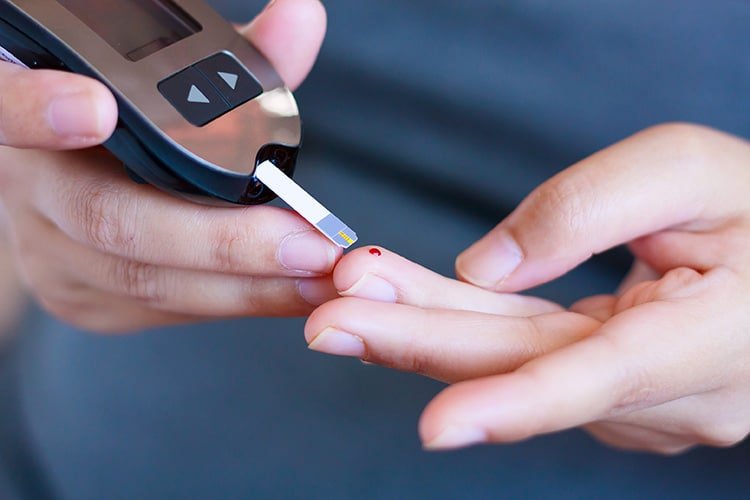Diabetes and oral health are inextricably linked, and anyone living with diabetes knows that it’s a serious condition and not be taken lightly. If diabetes is left unchecked, the condition can seriously damage your teeth and gums. As diabetes affects the blood, it means that all parts of your body are at risk, including your mouth.
What is diabetes?
Diabetes is a common disease which occurs when your blood glucose (or blood sugar) is too high.
Our cells need glucose as energy, and normally, a hormone called insulin helps transfer the glucose from our blood into our cells.
Sometimes our body doesn’t create enough insulin to sustain the process, so a lot of glucose remains in the blood and doesn’t reach our cells.
This extra glucose in our blood builds up over time, damaging the body and creating health issues.
Warning signs of diabetes
Unfortunately, six out of ten people show no symptoms of Type 2 diabetes and are only diagnosed once health issues start to arise.
For some people though, the symptoms are there, although not entirely obvious.
When glucose builds up in the blood, the body tries to get rid of it through the urine, so frequent trips to the toilet, especially during the night, are a common symptom of the disease.
Because of this increased urination, people find themselves thirsty a lot more and tend to drink more often.
Fatigue, grumpiness, and weight loss are also signs of diabetes, either together or individually.
So if you find yourself taking a nap after lunch when you never used to, or getting up in the middle of the night to go to the bathroom more often than you normally would, you might want to see your doctor for some blood tests.
Diabetes and oral health
People with diabetes are three times more likely to suffer from dental problems, so anyone with the condition needs regular check-ups with their dentist to keep an eye out for such conditions as:
Tooth decay
Your mouth is filled with billions of types of bacteria, and every single one of them feeds on sugar.
In doing so, plaque is formed, and this can eat away at the enamel of your teeth.
The more sugar in your blood and saliva, the more food for the bacteria, and the greater the damage to your enamel, resulting in tooth decay.
Gingivitis
Diabetes can greatly reduce your ability to fight the bacteria in your mouth.
Without regular brushing and flossing, the plaque can calcify under your gumline into a substance called tartar.
The plaque and tartar around your gums can irritate the base of your teeth, called the gingiva. In time, your gums become swollen and bleed easily.
This is known as gingivitis or early gum disease.
Periodontitis
If left untreated, gingivitis can develop into a more serious condition called periodontitis.
Eventually, periodontitis will destroy the soft tissue and bone that support your teeth, causing your gums and jawbone to recede.
This may cause your teeth to loosen and possibly fall out.
Diabetes makes this condition worse because it lowers the ability to resist infection and slows the healing process.
Thrush
Your mouth contains a type of fungus called Candida, which is normally kept in check by your natural immune systems.
Unfortunately for people with diabetes, their salvia may contain large amounts of sugars, which feed the fungus, encouraging it to grow. Once it grows out of control, it’s known as thrush.
Signs of thrush include creamy/white lesions on the tongue and cheeks, sometimes spreading to the roof of the mouth or back of the throat.
Dry mouth
One common symptom of diabetes is a lack of saliva, a condition known as dry mouth.
Without saliva to keep your mouth moist and bathe your teeth, you could be at risk of tooth decay, gum disease, and thrush.
What you can do about it
We all have to be on our toes when it comes to oral health, but people with diabetes need to be extra careful.
Obviously diabetics need to check their blood sugars regularly to make sure they are at acceptable levels, but keeping those glucose levels down is the first step in fighting oral health problems.
As with everyone else, brushing at least twice a day is essential, along with regular dental appointments, even if you don’t have a toothache.
Research studies suggest that treating gum disease can help improve blood sugar control in patients living with diabetes, decreasing the progression of the disease.
In other words, looking after your oral health can help your overall health.
Talk to us about diabetes and oral health
While it’s true that diabetes can make life harder, especially when it comes to your oral health, the good news is, prevention is in your own hands.
Regular dental check-ups, along with a disciplined oral health routine, can help maintain healthy teeth and gums.
If you would like to know more about diabetes and oral health, then please don’t hesitate to contact us.
Our friendly and helpful staff will be more than happy to help answer any questions you might have.


